2013 | Buch
Programming Multi-Agent Systems
10th International Workshop, ProMAS 2012, Valencia, Spain, June 5, 2012, Revised Selected Papers
herausgegeben von: Mehdi Dastani, Jomi F. Hübner, Brian Logan
Verlag: Springer Berlin Heidelberg
Buchreihe : Lecture Notes in Computer Science
